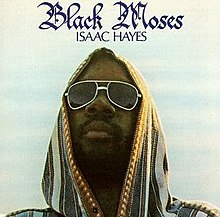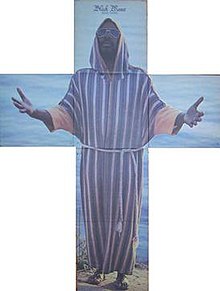Black Moses (album)
| Black Moses | ||||
|---|---|---|---|---|
 |
||||
| Studio album by Isaac Hayes | ||||
| Released | November 1971 | |||
| Recorded | March 1971–October 1971 | |||
| Genre | Soul | |||
| Length | 93:38 | |||
| Label | Enterprise | |||
| Producer | Isaac Hayes | |||
| Isaac Hayes chronology | ||||
|
||||
| Original LP | ||||

The LP's cover unfolds a poster-sized image of Hayes as "Black Moses". photo by Joel Brodsky
|
||||
| Professional ratings | |
|---|---|
| Review scores | |
| Source | Rating |
| AllMusic | |
| Clash | (favorable) |
| Paste | (88/100) |
| Pitchfork Media | (8.7/10) |
| Record Collector | |
| Rolling Stone | (unfavorable) 1972 |
| Rolling Stone |
|
| Spin | (9/10) |
| Uncut | |
Black Moses is the fifth studio album by American soul musician Isaac Hayes. It is a double album released on Stax Records' Enterprise label in 1971. The follow-up to Hayes' successful soundtrack for Shaft (also a double album), Black Moses features Hayes' version of The Jackson 5's hit single "Never Can Say Goodbye". Hayes' version became a hit in its own right, peaking at number 22 on the Billboard Hot 100.
In addition to "Never Can Say Goodbye", other selections on Black Moses include covers of songs made popular by The Carpenters ("(They Long to Be) Close to You", Toussaint McCall ("Nothing Takes the Place of You"), The Friends of Distinction ("Going in Circles"), Dionne Warwick ("I'll Never Fall in Love Again"), and Little Johnny Taylor ("Part Time Love"). Hayes names Black Moses as one of his most personal works.
The very same sample of "Ike's Rap II" was used in four tracks at about the same time in the mid-1990s: Hell Is Around The Corner by Tricky, Glory Box by Portishead, Jorge da Capadócia and Salve both by Brazilian rap group Racionais MC's. Ike's Rap II was also sampled by Alessia Cara in her song "Here" recorded in 2014.
The album's title derives from Stax executive Dino Woodward's nickname for Hayes, which he bestowed upon the musician after comparing the effects of his music on black audiences to the leadership of the biblical figure Moses. The then deeply Christian Hayes shied away from the nickname, finding it "sacrilegious", although journalist Chester Higgins popularized the "Black Moses" nickname in an article he wrote on Hayes for Jet. Hayes came to see "Black Moses" as a symbol of black pride:
...
Wikipedia
